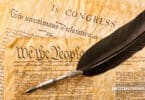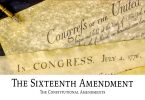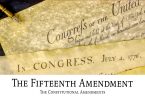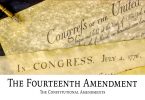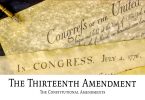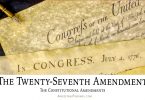The Twelfth Amendment to the US Constitution gives the proper procedure to electing the President and Vice President of the United States. It was a replacement for the clause in the original Constitution that set out how the Electoral College was originally supposed to work. The amendment was proposed in December of 1803 by Congress, and ratified by three-fourths of the state legislatures (one of several ways the Constitution provides for adding an amendment to it) in June of 1804. The new rules were in place in time for the 1804 presidential election between incumbent Thomas Jefferson and his opponent, Charles Pinkney. This was the fifth overall presidential election for the new United States. This amendment has ruled all presidential elections since that one.
What Does it Say?
The Twelfth Amendment reads:
“The Electors shall meet in their respective states, and vote by ballot for President and Vice-President, one of whom, at least, shall not be an inhabitant of the same state with themselves; they shall name in their ballots the person voted for as President, and in distinct ballots the person voted for as Vice-President, and they shall make distinct lists of all persons voted for as President, and all persons voted for as Vice-President and of the number of votes for each, which lists they shall sign and certify, and transmit sealed to the seat of the government of the United States, directed to the President of the Senate;
The President of the Senate shall, in the presence of the Senate and House of Representatives, open all the certificates and the votes shall then be counted;
The person having the greatest number of votes for President, shall be the President, if such number be a majority of the whole number of Electors appointed; and if no person have such majority, then from the persons having the highest numbers not exceeding three on the list of those voted for as President, the House of Representatives shall choose immediately, by ballot, the President. But in choosing the President, the votes shall be taken by states, the representation from each state having one vote; a quorum for this purpose shall consist of a member or members from two-thirds of the states, and a majority of all the states shall be necessary to a choice. And if the House of Representatives shall not choose a President whenever the right of choice shall devolve upon them, before the fourth day of March next following, then the Vice-President shall act as President, as in the case of the death or other constitutional disability of the President.
The person having the greatest number of votes as Vice-President, shall be the Vice-President, if such number be a majority of the whole number of Electors appointed, and if no person have a majority, then from the two highest numbers on the list, the Senate shall choose the Vice-President; a quorum for the purpose shall consist of two-thirds of the whole number of Senators, and a majority of the whole number shall be necessary to a choice. But no person constitutionally ineligible to the office of President shall be eligible to that of Vice-President of the United States.”
What Does it Mean?
This amendment changed the way presidential elections were conducted. Originally, each Elector in the Electoral College cast two votes. There was no distinction made between these votes as to whether they were for President or Vice-President. The candidate receiving the most electoral votes was made President, and the one with the second-most electoral votes was made Vice President. If there was a tie, the House of Representatives would vote amongst themselves to select the President and Vice President. There was no President and Vice President ticket who ran together before the Twelfth Amendment.
Because the 1796 and 1800 elections ended up electing Presidents and Vice Presidents who were political opponents, and thus usually working against each other while in office, Congress felt that a change to the way these two offices were elected was needed. The Twelfth Amendment was written, and it changed things to the way presidential elections are conducted today.

